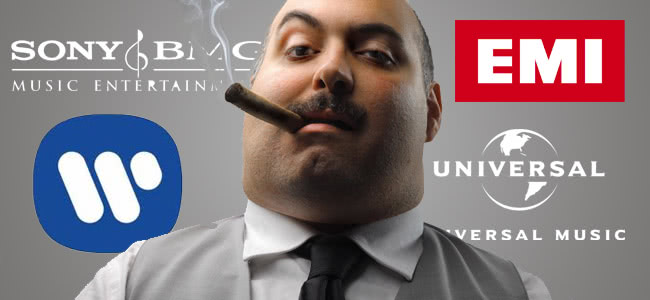Those sneaky old record labels are up to their old tricks again. Last week, we unearthed the conspiracy that big record companies used the advent of the CD as a ways to kill off vinyl to make bigger profits, while more contemporary headlines saw them grinning as they successfully sued another sorry individual for $222,000 over the download of just 24 songs. Now, one of their own is biting back over digital licensing.
American singer-songwriter James Taylor is the latest case of an artist taking issue with their record label’s use of their catalogue in digital sales, with Taylor suing his label Warner Bros for $US 2 million claiming that he’s not being paid fair royalties for digital downloads.
BBC News reports that Taylor filed a lawsuit in the Los Angeles Superior Court last week contending that he should be receiving a better royalty rate for downloads rather than for physical sales of his back catalogue from Warner Bros, which the performer was signed to for a decade between 1969 to 1979. A fertile period that included some of his most enduring songs, such as ‘Fire And Rain’, ‘Carolina In My Mind’ and his cover of ‘You’ve Got A Friend’.
Upon his departure from the label, Taylor signed a “termination and settlement agreement” that essentially allowed him to monitor and audit the record company’s accounts, discovering that his songs had been added to compilation albums and released through digital stores like Amazon and iTunes without his direct authorisation.
The issue stems from the fact that Warner Bros, and many large record labels like them, sign a single licensing deal with a digital distributor, as it’s continually sold as a single source – as opposed to physical manufacture which means continual pressing, distribution and marketing of CDs and Vinyl.
Taylor’s argument is that instead the labels are in fact selling a continual license in which the artist should continue to receive a fare, at the current rate, most recording contracts give the artist just 10% of revenue for sales but nearly 60% for a licence. Warner Bros is arguing that Taylor is not eligible for the higher royalty rate of a license as it’s a ‘one-time’ sale.
It’s sticky territory which also relates to how digital distribution is handled at the customer’s end, as the faux Bruce Willis story that the Hollywood action hero was looking to sue Apple over their iTunes policies in wanting his daughters to ‘inheret’ his digital collection.
Though the story proved to be a fallacy, it did highlight the unspoken contract between digital stores like iTunes and the customer when it comes to purchasing music, that the material isn’t strictly ‘owned’ when it’s bought, but simply ‘leased’.
Hypothetically, the purchase of a James Taylor song is merely ‘leased’ to the customer while Apple still owns the license to that song, which it in turn has purchased as a one-time licensing fee from Warner Bros. The reason for this is stop a second-hand digital market from surfacing that cuts out the first point of sale – namely the record labels and their digital distributors – but Taylor’s case is the latest in a long line that questions that the licensing also cuts them out of the royalties they deserve.
It’s a similar issue that indie darlings, Grizzly Bear, have had with the advent of popular streaming services like Spotify, saying that “after 10k plays we get approx $10.”
Others who have had issue with the licensing issues involved with the sales of digital downloads of their music include Chuck D of Public Enemy, Rob Zombie, Kenny Rogers, Rick James, Sister Sledge, and many more.
The legal precedent for Taylor’s $US 2 million case has already been set in 2010 when rap superstar Eminem and his publishing arm, FBT Productions, won a court ruling that digital sales should be treated under the licensing provisions of his contract.
If the singer-songwriter is triumphant, it could have ramifications on the dealing of publishing and licensing of digital songs, which in turn could seriously hurt the record labels that profit in selling on the licensing costs to digital distributors like Apple and Amazon – who would then in turn deal with the artist.
As we wrote in our opinion piece on the matter of artists’ getting their fair economic due, the changes could mean another shifts towards a grassroots approach that will see more artists delivering their content direct to the fans without the corporate middleman – a win-win for everyone involved. Except the record labels of course, but since when are we on their side anyway?

































